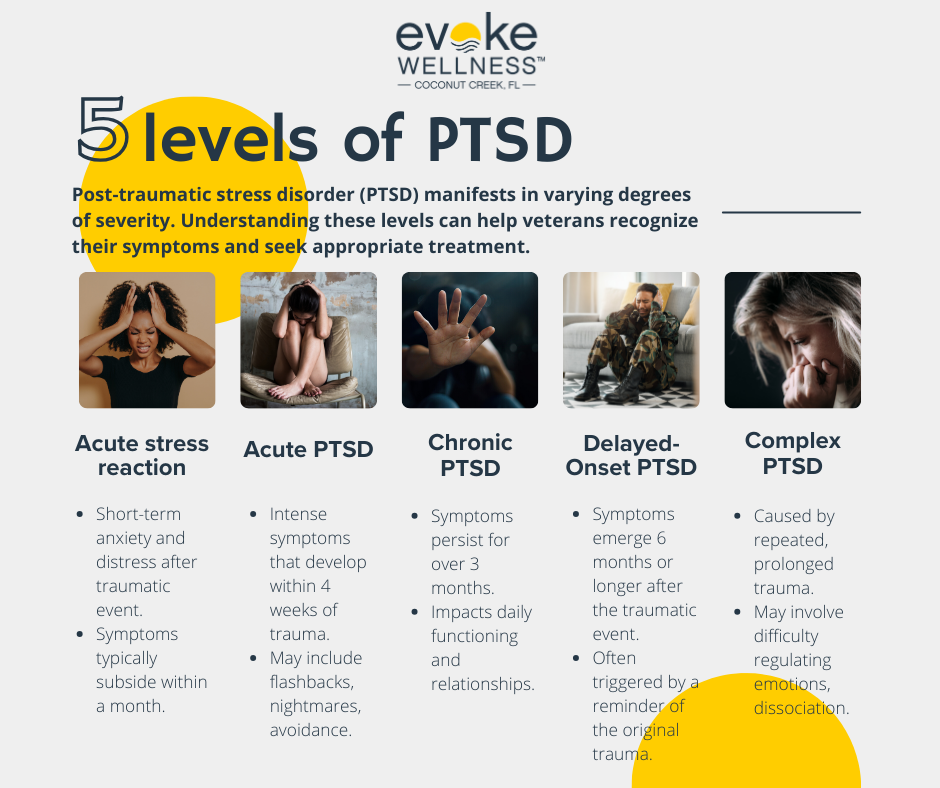You’ve sacrificed so much for our country. But now that you’re back, the battle still rages internally. The statistics are sobering – up to 20% of Iraq and Afghanistan veterans have PTSD. But you don’t have to suffer alone. Understanding and overcoming severe PTSD is possible. In this guide, you’ll learn:
- The key symptoms and statistics on veteran PTSD
- The various programs available to help:
- Effective therapies to manage your symptoms and start living again
- How to take control of your life once more after trauma through healthy coping strategies With the right treatment plan customized for you, post-traumatic stress doesn’t have to control your life. You can understand, manage, and overcome severe PTSD.
If you or a loved one is struggling, help is available today. Call (833) 969-3318 to speak with our compassionate team, or reach out online and schedule an appointment to begin a healing journey.
What Is Severe PTSD?
Severe post-traumatic stress disorder (PTSD) is a debilitating mental health condition that can significantly impact a person’s daily life and functioning. It is characterized by intense and persistent symptoms that arise after experiencing or witnessing a traumatic event.
Symptoms & Effects
- Intrusive thoughts, nightmares or flashbacks
- Avoidance of trauma reminders
- Negative changes in thinking and mood
- Hyperarousal and reactivity
Severe PTSD often co-occurs with other mental health issues like depression, anxiety or substance abuse disorders. Left untreated, it can severely disrupt relationships, work and overall quality of life.
Treatment Options
Effective treatment is available through trauma-focused psychotherapy and medications. Residential treatment programs provide comprehensive, intensive care for severe PTSD and any co-occurring disorders.
The 5 Levels of PTSD
Identifying your level can guide the right therapeutic approach for healing from this challenging condition. Can my PTSD impact addiction?
Why PTSD Is So Debilitating for Veterans
Post-traumatic stress disorder (PTSD) can be an incredibly debilitating condition for veterans who have experienced traumas during their military service. As a veteran, you may find yourself reliving those traumatic events through intrusive thoughts, nightmares, and flashbacks.
The Invisible Wounds
These invisible wounds of PTSD can make everyday situations feel overwhelming and trigger intense emotional and physical reactions. You may find yourself constantly on guard, hyper-vigilant, and easily startled – making it difficult to feel safe, even in familiar environments.
Disrupting Daily Life
PTSD can disrupt your ability to function normally, impacting relationships, work performance, and overall quality of life. The avoidance behaviors and emotional numbing often associated with PTSD can further isolate you from loved ones and activities you once enjoyed.
The Importance of Treatment
Seeking professional treatment is crucial for managing PTSD symptoms and regaining a sense of control over your life. Through evidence-based therapies like cognitive behavioral therapy (CBT) and prolonged exposure therapy (PE), you can learn coping strategies to process traumatic memories and gradually reduce their impact on your daily life.
Residential Treatment for Severe PTSD
For veterans struggling with severe, treatment-resistant PTSD symptoms, residential care offers an intensive level of support. At Evoke Wellness, our residential program provides:
Specialized PTSD Therapy
- Evidence-based trauma treatments
- Cognitive processing therapy
- Prolonged exposure therapy
Dual Diagnosis Treatment
- Integrated treatment for co-occurring addictions
- Holistic mind-body healing approaches
Therapeutic Community
- 24/7 peer support and staff monitoring
- Structured daily programming
- Alumni network for continued recovery
In a safe, trigger-free environment, you can immerse yourself fully in healing from the debilitating effects of PTSD. Our comprehensive program gives you the tools to manage symptoms and rebuild your life.
Dual Diagnosis Treatment for PTSD and Addiction
Integrated Approach
For veterans struggling with both PTSD and substance abuse, a comprehensive dual diagnosis treatment program is crucial. This integrated approach simultaneously addresses the trauma underlying PTSD and the addictive behaviors.
Evidence-Based Therapies
Effective dual diagnosis care combines evidence-based psychotherapies like cognitive behavioral therapy (CBT) with sober support groups and holistic mind-body practices. Trauma-focused CBT helps process the root traumatic experience driving PTSD symptoms.
Medication Management
Prescribed medications can alleviate PTSD symptoms like anxiety, depression, and insomnia that may trigger substance abuse as a coping mechanism. Careful medication management, counseling, and lifestyle adjustments create lasting recovery.
Alumni and Sober Support Groups for PTSD Recovery
Getting support after treatment is crucial for sustained PTSD recovery. Our alumni program connects you with a community of veterans who understand your journey.
Ongoing Peer Support
- Share experiences in a safe, judgment-free environment
- Celebrate milestones and accountability partners
- Build lasting sober friendships
Sober Social Events
- Monthly gatherings, outdoor activities, and more
- Strengthen your sober support network
- Practice coping strategies in real-world situations
Volunteer Opportunities
- Give back by mentoring others
- Build self-worth through service
- Make a positive impact while staying motivated
Stay connected after treatment completes – our alumni and sober support groups provide the tools for lifelong healing from PTSD.
FAQ on Severe PTSD Treatment for Veterans
What is PTSD?
- Post-traumatic stress disorder (PTSD) is a mental health condition triggered by experiencing or witnessing a terrifying event.
- Symptoms may include flashbacks, nightmares, severe anxiety, and uncontrollable thoughts about the traumatic event.
How Common is PTSD in Veterans?
- Around 12% of Gulf War veterans experience PTSD each year.
- As many as 30% of Vietnam veterans have had PTSD in their lifetime.
What Treatment Options are Available?
- Residential treatment programs provide intensive trauma-focused therapy.
- Dual diagnosis treatment addresses PTSD along with any co-occurring substance abuse issues.
- Process addiction treatment helps veterans overcome compulsive behaviors like gambling.
How Can I Get Support After Treatment?
- Alumni programs connect you with others who understand your experiences.
- Sober support groups provide accountability and encouragement for maintaining sobriety.
The right PTSD treatment program is vital for veterans regaining their lives after trauma. Seek out specialized care to begin your journey of healing.
Conclusion
As a veteran, you know the realities of war and its lasting effects. PTSD is more than just a diagnosis – it’s a daily battle. But with the right treatment and support, hope and healing are possible. Don’t struggle alone. Reach out to fellow veterans and professionals who understand your experience. Explore residential programs that combine therapy and community. With small steps each day, you can move forward and reclaim your life. The path is there – you just have to take it, trusting you have the inner strength to persevere. We’re rooting for you.
Begin Your Journey With Evoke Wellness at Coconut Creek
Evoke Wellness at Coconut Creek is a full-service addiction treatment facility serving Florida residents. We base each of our programs on the individual’s severity of symptoms and use a combination of evidence-based therapies and holistic approaches to address the needs and recovery goals of the patient.
If you or a loved one is struggling, help is available today. Call (833) 969-3318 to speak with our compassionate team, or reach out online and schedule an appointment to begin a healing journey.



